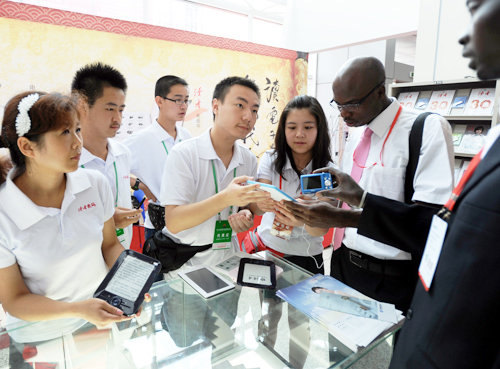|
 |
|
EASIER READING: Foreign businessmen look at Chinese e-readers at the 17th Lanzhou Investment and Trade Fair in Lanzhou, capital of Gansu Province on July 6 (NIE JIANJIANG) |
After Amazon's Kindle e-reader became a market hit in 2008 in the United States, a string of Chinese companies have jumped on the bandwagon. There are currently 41 Chinese companies—of 80 throughout the world—engaged in producing e-readers.
E-reader sales in China totaled 611,800 units in 2009 and 1.07 million units in 2010, accounting for 15.5 percent and 20 percent of the world's total, respectively, only behind the United States. The U.S. intelligence firm iSuppli Corp. even expects China to replace the United States by 2012 to become the world's largest e-reader market.
But after torrid growth over the past two years, the Chinese e-reader industry is on the ropes.
Newspapers are filled with reports that two Chinese IT giants—Aigo and Founder—have decided to bow out of the e-reader manufacturing industry as market demands sinks.
Market leader Hanvon, which controls two thirds of domestic market shares, reported heavy losses of 176 million yuan ($27 million) for the first half of this year, compared with profits of 87 million yuan ($13.4 million) for the same period last year. Its revenues totaled 258 million yuan ($40 million), diving 61.71 percent from a year ago.
With such gloomy results, the market prosperity of the past two years seems a distant memory for Chinese e-reader makers.
Stumbling blocks
E-readers provide a paper-like reading experience. Some manufacturers make the devices more attractive by adding functions such as handwriting, intelligent search engines and dictionaries.
But it's no secret that Chinese e-reader makers are plagued with many shortfalls. Among them is the significant technology barrier.
Many products cannot support all formats of e-books or maintain stable access to the Internet while others have small storage capacities and battery lives. Even Hanvon products have problems.
"Our e-ink technologies are far from perfect," said Wang Bangjiang, Vice President of Hanvon. "Our products are still unable to support all formats of video and audio, and the screens are also quite slow to refresh."
The e-reader market in China is taking off. But they have no unique strength in that field, said Wei Yuhuai, an analyst with the CCID Consulting. "They rely on Taiwan's manufacturers for the flat panels, on telecoms operators for the channel and on publishers for the content," he said.
It's no surprise that Apple Inc.'s iconic tablet iPad poses the most serious threat to domestic e-readers. It features interactive technologies and a touch-screen display that allows users to browse the Internet, read books, watch videos and check e-mails. Most importantly, in March 2011, Apple lowered the price of its 16-gigabyte Wifi iPad from 3,988 yuan ($614) to 2,888 yuan ($448). Many e-readers of domestic brands are still priced above 3,000 yuan ($465).
In the first quarter, only 280,000 e-readers were sold in China, a decline of 7.41 percent from last quarter, while tablet PC sales reached 1.04 million units, up 32.5 percent, said the Beijing-based think-tank Zero2IPO Research Center.
Competition with the iPad triggered market contractions, but the root cause was high prices, which impeded customer acceptance, said Zhang Yanan, a researcher with Zero2IPO.
| 